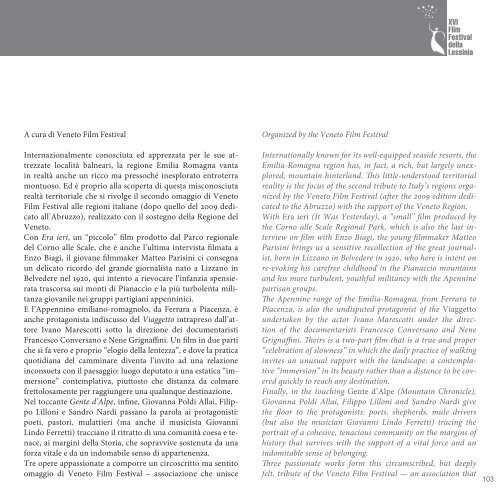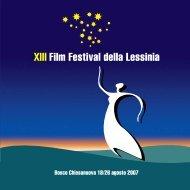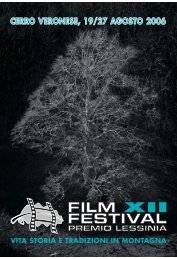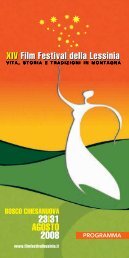2010 Interno Catalogo FFL.indd - Film Festival della Lessinia
2010 Interno Catalogo FFL.indd - Film Festival della Lessinia
2010 Interno Catalogo FFL.indd - Film Festival della Lessinia
You also want an ePaper? Increase the reach of your titles
YUMPU automatically turns print PDFs into web optimized ePapers that Google loves.
A cura di Veneto <strong>Film</strong> <strong>Festival</strong><br />
Internazionalmente conosciuta ed apprezzata per le sue attrezzate<br />
località balneari, la regione Emilia Romagna vanta<br />
in realtà anche un ricco ma pressoché inesplorato entroterra<br />
montuoso. Ed è proprio alla scoperta di questa misconosciuta<br />
realtà territoriale che si rivolge il secondo omaggio di Veneto<br />
<strong>Film</strong> <strong>Festival</strong> alle regioni italiane (dopo quello del 2009 dedicato<br />
all’Abruzzo), realizzato con il sostegno <strong>della</strong> Regione del<br />
Veneto.<br />
Con Era ieri, un “piccolo” fi lm prodotto dal Parco regionale<br />
del Corno alle Scale, che è anche l’ultima intervista fi lmata a<br />
Enzo Biagi, il giovane fi lmmaker Matteo Parisini ci consegna<br />
un delicato ricordo del grande giornalista nato a Lizzano in<br />
Belvedere nel 1920, qui intento a rievocare l’infanzia spensierata<br />
trascorsa sui monti di Pianaccio e la più turbolenta militanza<br />
giovanile nei gruppi partigiani appenninici.<br />
E l’Appennino emiliano-romagnolo, da Ferrara a Piacenza, è<br />
anche protagonista indiscusso del Viaggetto intrapreso dall’attore<br />
Ivano Marescotti sotto la direzione dei documentaristi<br />
Francesco Conversano e Nene Grignaffi ni. Un fi lm in due parti<br />
che si fa vero e proprio “elogio <strong>della</strong> lentezza”, e dove la pratica<br />
quotidiana del camminare diventa l’invito ad una relazione<br />
inconsueta con il paesaggio: luogo deputato a una estatica “immersione”<br />
contemplativa, piuttosto che distanza da colmare<br />
frettolosamente per raggiungere una qualunque destinazione.<br />
Nel toccante Gente d’Alpe, infi ne, Giovanna Poldi Allai, Filippo<br />
Lilloni e Sandro Nardi passano la parola ai protagonisti:<br />
poeti, pastori, mulattieri (ma anche il musicista Giovanni<br />
Lindo Ferretti) tracciano il ritratto di una comunità coesa e tenace,<br />
ai margini <strong>della</strong> Storia, che sopravvive sostenuta da una<br />
forza vitale e da un indomabile senso di appartenenza.<br />
Tre opere appassionate a comporre un circoscritto ma sentito<br />
omaggio di Veneto <strong>Film</strong> <strong>Festival</strong> – associazione che unisce<br />
Organized by the Veneto <strong>Film</strong> <strong>Festival</strong><br />
XVI<br />
<strong>Film</strong><br />
<strong>Festival</strong><br />
<strong>della</strong><br />
<strong>Lessinia</strong><br />
Internationally known for its well-equipped seaside resorts, the<br />
Emilia-Romagna region has, in fact, a rich, but largely unexplored,<br />
mountain hinterland. Th is little-understood territorial<br />
reality is the focus of the second tribute to Italy’s regions organized<br />
by the Veneto <strong>Film</strong> <strong>Festival</strong> (aft er the 2009 edition dedicated<br />
to the Abruzzo) with the support of the Veneto Region.<br />
With Era ieri (It Was Yesterday), a “small” fi lm produced by<br />
the Corno alle Scale Regional Park, which is also the last interview<br />
on fi lm with Enzo Biagi, the young fi lmmaker Matteo<br />
Parisini brings us a sensitive recollection of the great journalist,<br />
born in Lizzano in Belvedere in 1920, who here is intent on<br />
re-evoking his carefree childhood in the Pianaccio mountains<br />
and his more turbulent, youthful militancy with the Apennine<br />
partisan groups.<br />
Th e Apennine range of the Emilia-Romagna, from Ferrara to<br />
Piacenza, is also the undisputed protagonist of the Viaggetto<br />
undertaken by the actor Ivano Marescotti under the direction<br />
of the documentarists Francesco Conversano and Nene<br />
Grignaffi ni. Th eirs is a two-part fi lm that is a true and proper<br />
“celebration of slowness” in which the daily practice of walking<br />
invites an unusual rapport with the landscape: a contemplative<br />
“immersion” in its beauty rather than a distance to be covered<br />
quickly to reach any destination.<br />
Finally, in the touching Gente d’Alpe (Mountain Chronicle),<br />
Giovanna Poldi Allai, Filippo Lilloni and Sandro Nardi give<br />
the fl oor to the protagonists: poets, shepherds, mule drivers<br />
(but also the musician Giovanni Lindo Ferretti) tracing the<br />
portrait of a cohesive, tenacious community on the margins of<br />
history that survives with the support of a vital force and an<br />
indomitable sense of belonging.<br />
Th ree passionate works form this circumscribed, but deeply<br />
felt, tribute of the Veneto <strong>Film</strong> <strong>Festival</strong> — an association that<br />
103





